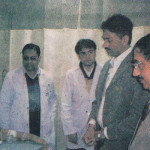
Our Focus is simple
Better Kidney Health
The kidneys are bean-shaped organs located on either side of the lower back, just below the rib cage. Their function is to:
|
| Paramount to good care of the kidneys is reducing the toxic load they have to deal with, especially proteins and chemical contaminants which can build up in the kidneys, slowing their function, increasing acidity and raising blood pressure. So, consider lightening the diet–instead of eating meat every day, try going vegetarian for a day or so a week. A vegetable/fruit-based diet allows the body system to alkalinize via the kidneys, lowering blood pressure, and contributing to a sense of well-being. Also, drinking enough water so that the urine is a light color of yellow. A whole lot of water is not necessarily good for the kidneys, and it is always better to drink small amounts of water throughout the day, rather than gulping down a quart or two because you’re thirsty. This just creates kidney stress. |
| SIGNS OF KIDNEY DAMAGE • High Blood Pressure • Change in amount of urine passed • Edema-swelling, usually in the hands, face, feet, or ankles • Tiredness • Generalied itching or numbness • Headaches • Weight Loss • Appetite loss • Sleep problemsURINARY TRACT IMAGING• Imaging helps the health care provider find the causes of urinary tract problems. • Urinary tract imaging techniques include conventional radiology, or x rays; ultrasound; magnetic resonance imaging (MRI) computerized tomographny ( CT) scans; and radionuclide scans. • After most imaging tests, the person can immediately resume normal activity. PROSTATE PROBLEMS • Common prostate problems are prostatitis and benign prostatic hyperplasia (BPH). URINARY TRACT INFECTIONS • A urinary tract infection (UTI) is an infection in the urinary tract. Infections are caused by Microbes-organisms too small to be seen without a microscope. • Bacteria that live in the digestive tract, in the vagina, or around the urethra are the most common cause of UTIs. • You should see your health care provider if you have any of these signs of symptoms. 1. a burning feeling when you urinate. • If you have repeat infections or are in the hospital, your urine may be cultured. The culture is performed by placing part of the urine sample in a tube or dish with a substance that encourages any bacteria present to grow. • UTIs are treated with antibiotics that can kill the bacteria causing the infection. The antibiotic prescribed will depend on the type of bacteria causing your UTI. • About one out of every five young women who have a UTI will have another one. Some women have three or more UTIs a year. • Once a man has a UTI, he is likely to have another because bacteria can hide deep inside prostate tissue. • Anyone who has diabetes or a problem that makes it hard to urinate may have repeat infections. |
| PREVENTION OF KIDNEY DISEASES |
| In some cases, you cannot prevent kidney failure. But there are some steps you can take that will lower your risk: |
| • Maintain normal blood pressure. • If you have diabetes, control your blood sugar. • Avoid long-term exposure to toxic substances, such as Lead Poisoning nd solvents. • Do not abuse Alcohol Abuse and Alcoholism or over-the-counter pain medication. • Limit the amount of drugs toxic to the kidney. • If you have chronic kidney failure, talk to your doctor before you become pregnant. |












